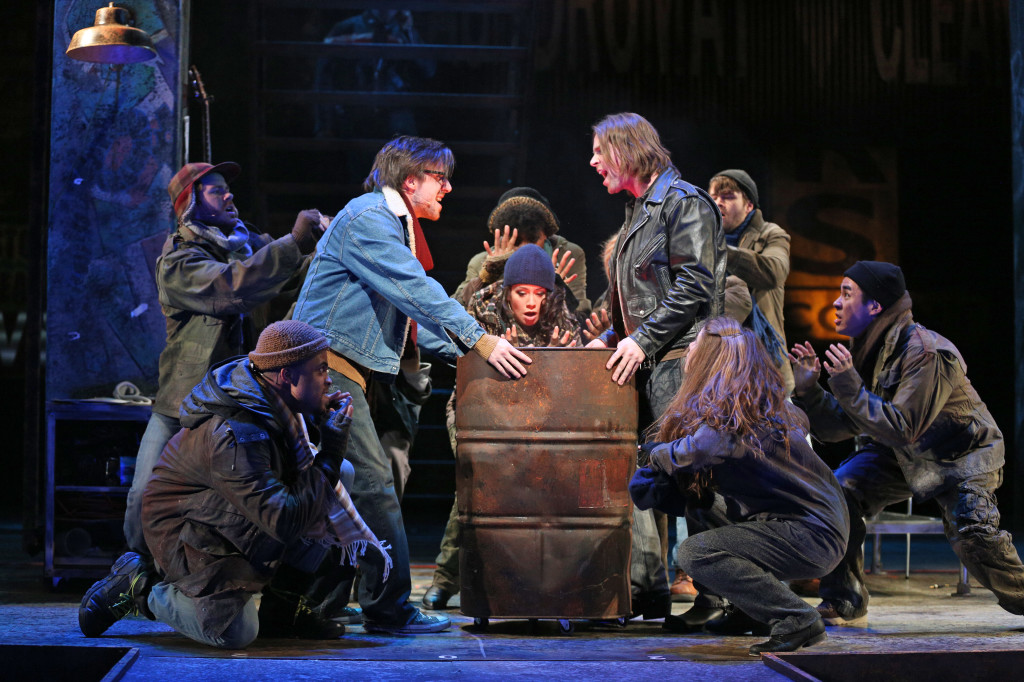
Photo by Gus Aronson.
Controversy erupted last month over the selection of Hairspray as the spring musical. As a result, prompted by weeks of discussion among faculty, administrators, and students about race and diversity, Fieldston’s Theater and Dance Department decided to table Hairspray as the spring musical. The department has instead chosen Rent, composed by Jonathan Larson, as this year’s play.
Fieldston’s Theater and Dance Department, led by Claire Mottola, has been known for its commitment to progressive and cutting edge productions. It has produced shows that are provocative and sensitive, satirical and investigative, delightful and upsetting, inclusive and diverse. One English teacher observed that the Theater Department productions read like a diversity checklist of the big and small identifiers. There were plays by women, plays by men, plays by gay men and women, plays by Asian Americans and Arab Americans. There were roles and characters shaped by class, ethnicity, sexual orientation, ability, age, region, religion, and race. There seems to be a similar variety amongst the actors of the company as well. Known to never censor, for its color-blind casting, and to encourage student directed and written productions, the performing arts department has a reputation for honoring Fieldston’s mission of inclusive learning and progressive education. Past spring musicals have included Ragtime (2011), a show with a large multi-racial cast that explored racism in America, Spring Awakening (2012), which delved into themes of teenage sexuality, sex, and suicide, and the comedic, historical musical Bloody Bloody Andrew Jackson (2013), which examined racial subjugation and genocide during Andrew Jackson’s term as president. And so, last spring, aiming to retain the spirit of pushing boundaries and educating through the uncomfortable, the Theater Department chose Hairspray as the 2016 spring musical.
Opposition, however, to the production surfaced later in the fall of 2015. The criticism, originally against the way that the show was allegedly rolled out, morphed into disenchantment with the material in the musical, and then graduated into accusations of a lack of racial diversity amongst the drama students.
Almost immediately, Clare Mottola held a series of town hall meetings to openly discuss the issues.
Hairspray, based on the 1988 film by John Waters, is a satirical musical about the injustices of American society that chronicles the civil rights movement in 1960’s Baltimore. Hairspray was initially chosen for its strong choreography, large cast, satirical lens, and distinctive style. Drama teacher Stephanie Stone and Dhari Noel, class of 2011, were appointed to direct the play. Focusing on themes of race, class, and gender, the play presented opportunities for students with various identifiers to get involved. Some students, however, felt that Hairspray’s depiction of African Americans was problematic. One student stated that Tracy, the protagonist of the musical, “comes across as a white savior—she’ll be the one to free the black community from oppression.” A junior, Greg Pizzurro, explained that the show downplays the severity of racial issues of the time.
Additionally, many felt that the controversy was more nuanced and indicative of a larger, underlying problem. Olivia Gonzalez (V) stated, “There is an obvious lack of students of color in the drama department and therefore a problem arises when a play about race is chosen and you need to cast people of color.”
Sydney Cameron, a junior, explained that, “some people of color feel like they can’t audition for all the shows and this show is one of the only ones they can be in.”
And yet there was support for the production. Olivia Gonzalez later said, “We’ve never attempted a show that focuses on race as strongly as Hairspray does.” She argued that the school should use this opportunity to educate and inform on issues pertaining to race, “It prompts a conversation about what our grandparents and parents went through, and now what we’re going through—its almost another civil rights movement.”
Dachelle Washington, a sophomore, stated that “It would have been such an amazing experience to do the show and have such a diverse cast, because we usually don’t.” Sydney Cameron shared this sentiment, stating, “we should see this as a learning experience. At times, uncomfortable things can be really beneficial and educational.”
And so the department was confronted with a decision. Cara Geeser (VI) explained: “We don’t want to put on the production and have people feel hurt or used or uncomfortable, but getting rid of Hairspray isn’t going to solve the lack of racial diversity.”

Photo by Liz Lauren.
Following these numerous discussions in which students had the opportunity to voice their questions, concerns, and reactions, on Wednesday December 9th, all students and faculty were invited to attend a meeting to hear updates on the spring musical. Ms. Mottola explained that after “incredible conversation, rich dialogue, and tremendous growth, the department has decided to postpone the production of Hairspray until we, as a school, are ready to do this play.”
Ms. Mottola addressed many students’ concerns by acknowledging that the privileges afforded to Fieldston students are not always equal and that “the feelings of being the other are pervasive.” She apologized for “the pain that the roll out caused” and that students felt objectified, othered, and targeted.
Ms. Mottola, the theatre and dance department chair stated that “as a department, we talk about diversity all the time. Whenever we’re choosing a production, diversity is a main theme. We talk about all the big eight identifiers. We’re always looking to have the most diverse cast – in all terms of diversity.” Mottola agreed that the theatre department is lacking racial diversity. However, she urged people to be mindful of saying that they have “‘never seen a person of color on stage’ because that would negate all the work students of color in the department have done—it would be a terrible thing to do to them.”
Ms. Mottola acknowledged that moving forward, the department hopes to host events for the community focusing on discussions about race in theatre and how to make the drama department more racially diverse. Many students felt that facilitating dialogues about race was a positive first step forward.
Mottola implored Fieldston students who are committed to the creation of a more racially diverse department to join her, and her department, in a purposeful conversation about race. From Yale to Amherst, academic institutions across the country are engaging in conversations about race and the role diversity plays on their campuses.
As Clare Mottola stated, “this is a national moment, we’re surrounded by young people who will be agents of change—we’ve got seize this moment.”






